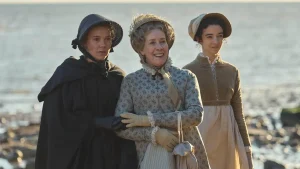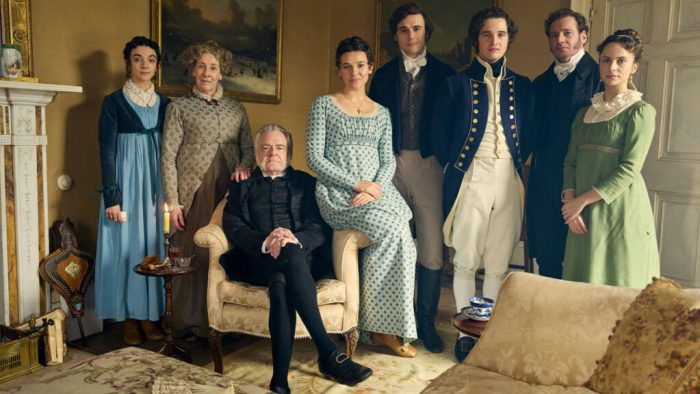Gill Hornby’s ‘Miss Austen’ comes to life in new miniseries on PBS
Reviewed by Jeffrey Sanzel
The following is based on viewing Part One of Masterpiece’s presentation of ‘Miss Austen.’
Jane Austen’s correspondence was vast, with an estimation of her penning thousands of letters: Only 160 remain. For reasons unknown, years after Austen’s death, her sister, Cassandra, burned the bulk of Jane’s letters.
Gill Hornby’s intriguing and entertaining Miss Austen: A Novel of the Austen Sisters (2020) speculates why. Hornby’s fictional explanation captures Jane Austen’s style, tone, and diction, with Hornby remarkably echoing Austen’s sly wit and keen observations. Hornby’s book could be seen as a seventh novel in Austen’s sadly small canon.

Played in two timelines, the story follows the older Cassandra, in 1830, traveling to Kintbury on the pretext of helping Isabella Fowle, who is mourning her father’s death. However, Cassandra’s true motivation is retrieving the letters written by Jane and herself to Eliza Fowle, Isabella’s mother. Hornby uses Cassandra’s discovery and reading of the cache to flashback to the late 18th and early 19th century.
In the teleplay, Andrea Gibb puts Isabella’s father, Reverend Fowle, on his deathbed (flickering candles and soft focus), imparting Cassandra a dying wish for Isabella. In this moment, the series sets itself at odds with the source—darker and leaning into the drama (or even melodrama)—rather than the edgier, droller, but more inspired world of the novel. Both touch on the themes of women in society, family obligations, and the pressure for marriage and children. But the approaches are distinctly different, with Gibb’s version trodding heavily, highlighting the romantic elements. The teleplay’s tone (and Aisling Walsh’s direction) departs from Hornby, and in essence, Austen: the author’s brilliance was balancing heartbreak with humor, satire with a sense of humanity. Lacking these vital elements, the filmed version seems bleached and untextured.
Keeley Hawes is particularly effective as the older Cassandra, conveying thought with subtlety and presenting the older Austen sister as a woman missing nothing but keeping her own counsel. Synnøve Karlsen easily matches her as the young Cassandra, giving an equally rich performance. Patsy Ferran makes Jane quirky and likable and easily drops the few bon mots expected of the witty writer. However, along with Madeline Walker’s pleasant Eliza Fowle, the relationships feel more Little Women than Mansfield Park.
Rose Leslie’s Isabella is lovely if reinvented as a more traditional heroine. Jessica Hynes’ waspish sister-in-law, Mary, is more ominous than necessary due less to her choice than the approach to her plotline. The same is true of the always wonderful Phyllis Logan, who plays matriarch Mrs. Austen. The book’s Mrs. Austen possesses more than a few shades of Mrs. Bennett; instead, she is given a less colorful portrait to create. Mirren Mack, in her brief appearance, manages the right blend of “respectful impudence” as the Fowles’ maid, Dinah. As for the men, they do little but respond or spout platitudes.
Ultimately, the major point is legacy. When clergyman Mr. Dundas (Thomas Coombes, in a delightfully wicked cameo suggesting Pride and Prejudice’s unctuous Mr. Collins) suggests to Cassandra that the world is lacking a definitive biography so the public could know the real Jane Austen, she rebukes him. “Everything one needs to know about Jane Austen is to be found in the pages of her novels. There is nothing more.” In essence, this is the thesis. Jane’s life should be defined only by what she offered the public, and her private life and thoughts should remain just that—private.
Miss Austen offers an interesting—if fictional—glimpse into one of the great literary figures of all time. That said, it is clearly the old saw: “The book was better.”
The four-part series streams Sundays on PBS.org through May 18.







